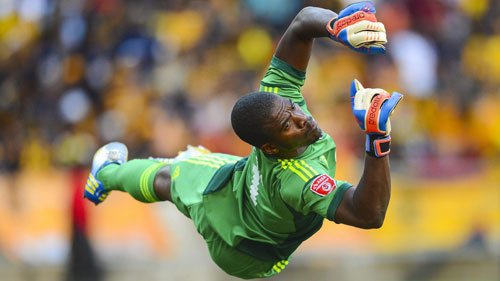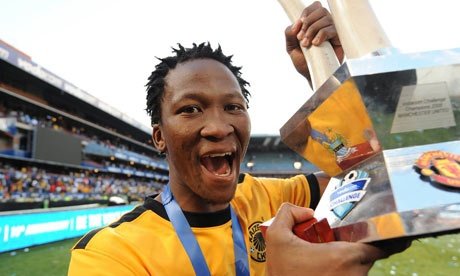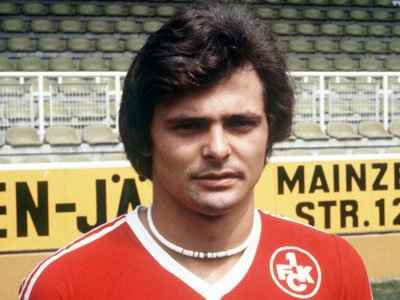Football and Murder: The Deadly Game
With the UK observing Remembrance Day last Sunday, many football clubs have been honouring past players who met their fate in battle during the First World War. Throughout the weekend, games began with the traditional one minute’s silence. Today, however, I would like to extend this remembrance to those footballers who lost their lives, not on the battlefield, but at the hands of a murderer.
 Last month saw the tragic news of the murder of Senzo Meyiwa, South Africa’s national football team goalkeeper and captain. During an attempted robbery in his girlfriend’s house, in Johannesburg, Meyiwa was shot by one of the two assailants.
Last month saw the tragic news of the murder of Senzo Meyiwa, South Africa’s national football team goalkeeper and captain. During an attempted robbery in his girlfriend’s house, in Johannesburg, Meyiwa was shot by one of the two assailants.
Meyiwa’s death marks a great loss for the world of football and the nation of South Africa. Meyiwa, 27, was an up-and-coming star in African and National football.
Meyiwa was one of three South African sporting heroes to pass away in as many weeks: Former 800-meter world champion and Olympic silver medalist Mbulaeni Mulaudzi suffered fatal injuries in a car crash and female boxer Phindile Mwelase died in hospital following a two-week coma after being knocked out during a fight.
Meyiwa’s untimely death was not the first of its kind, and unfortunately it will not be the last.
 Only a few years ago, in 2012, Jeffrey Ntuka – who signed for Chelsea in 2003, spending his time on loan to Belgian club Westerlo before heading to African side Kaizer Chiefs – was stabbed to death in Kroonstad, South Africa, at the young age of 26.
Only a few years ago, in 2012, Jeffrey Ntuka – who signed for Chelsea in 2003, spending his time on loan to Belgian club Westerlo before heading to African side Kaizer Chiefs – was stabbed to death in Kroonstad, South Africa, at the young age of 26.
Ntuka’s story is a tragic one, after the joy of being signed by one of England’s top clubs, Jeffrey never quite made the first team. He was sent out on loan to Westerlo where he spent many seasons. After losing both parents in a short space of time, he decided to move back closer to home and to one of Africa’s top clubs, Kazier Chiefs. The loss of his parents hit Ntuka hard and he found solace at the end of a bottle. His sad, yet all too common tale came to a heartbreaking end when he met his demise during an altercation on a night out. His killer was sentenced to 12 years in November 2013. The South African national team capped him 5 times before his death.
Earlier this year Zambian professional footballer Chiwanki Lyainga (30) died in hospital after a fatal stabbing in the capital of Lusaka. Lyainga was still playing for Zambian side Red Arrows at the time of his death. Police believe he was involved in an argument with a fellow drinker in a bar and his death resulted from the ensuing fight.
Columbia has had their share of tragedy over the years. Several prominent national stars have been killed in the last decade.
Edison Chara (31), who had finished his playing career in China, was shot during a disagreement following a card game while home in Columbia.
Elson Becerra (27) was shot in a nightclub a number of days after a dispute with a group of men in his home town of Cartagena. Becerra had 14 international caps for his country.
Albeiro Usuriaga (37) who wore his countries shirt on 15 occasions was shot dead in a nightclub in Cali, Columbia back in 2004.
The most notable murder in Columbian football history was the killing of Andrés Escobar following his own-goal in the 1994 World Cup.
[youtube id=”hjI5H6tph5s” align=”center” autoplay=”no” maxwidth=”550″]
Escobar turned the ball into his own goal while trying to clear a cross from United States midfielder John Harkes. Columbia lost the game 2-1. As the team went onto Las Vegas to meet with family, Escobar decided to return home to Columbia. His decision turned out to be fatal.
On a night out with friends, Escobar found himself isolated at the end of the night. Approached by three men, Escobar was shot 6 times. It was reported one of the men shouted ‘Gol!’ imitating a passionate Latin-American commentator while the shots were fired.
The killer was brought to justice and Escobar’s memory lives on throughout Columbia.
Although not having enlisted to any army, many find themselves in a battlefield by no fault of their own. Poland in the early ‘40s was one such battlefield.
Both Leon Sperling and Józef Klotz were killed in 1941 by the Nazi regime in Poland due to their Jewish heritage. Sperling played 16 times for his country before the invasion of the German army and also played during the 1924 Paris Olympic Games. Sperling captained Cracovia Kraków to their first three Polish Championships in 1921, ‘30 and ‘32.
Klotz, although only representing his country twice, was the first goal scorer for the Polish national team. In their second international match Poland faced Sweden in Stockholm, beating them 2-1, having lost their inceptive bout at home to Hungary 3-0.
 Lutz Eigendorf, was yet another victim of German malice. His demise, however, came much later than Sperlling and Klotz.
Lutz Eigendorf, was yet another victim of German malice. His demise, however, came much later than Sperlling and Klotz.
Lutz joined BFC Dynamo’s youth team at the age of 14. He stayed with the club, and was promoted to the first team at 18 by 1974. By ’78 he had made his debut for the East Germany national team but Eigendorf had other plans.
During a game with Dynamo in 1979 Eigendorf slipped away from his team and defected to the West. Although many athletes had defected in the past, this left a particular sour taste in the mouth of some in the East. This was due to the fact his club, BFC Dynamo, was a patronage of the Stasi.
For those of you who don’t know, the Stasi were not very nice people. The secret police of the German Democratic Republic (East Germany) were renowned for being a highly systematized and ruthless organization.
As a defector, Eigendorf was not allowed to play for the West Germany national team for a year (as per UEFA rulings at that time) and bided his time training youth teams while still playing at club level. Before he got a chance to play for the West, in 1983, Lutz was killed when his car collided with a tree.
Although it was suggested that there was foul play in the “accident” it was not until the ‘90s after the re-unification of Germany that it was confirmed that the incident resulting in Eigendorf’s death was a successful assassination by the Stasi.
Though the above-mentioned players represent a mere fraction of those footballers whose lives were cut short by murderers, their deaths reminds us that the violence in this world is unprejudiced and that once great men of the footballing world, just like any of us, can have everything taken away in the blink of an eye.
So as the minutes silence comes to an end for another season, I hope we can remember all those who have lost their lives at the hands of another.
